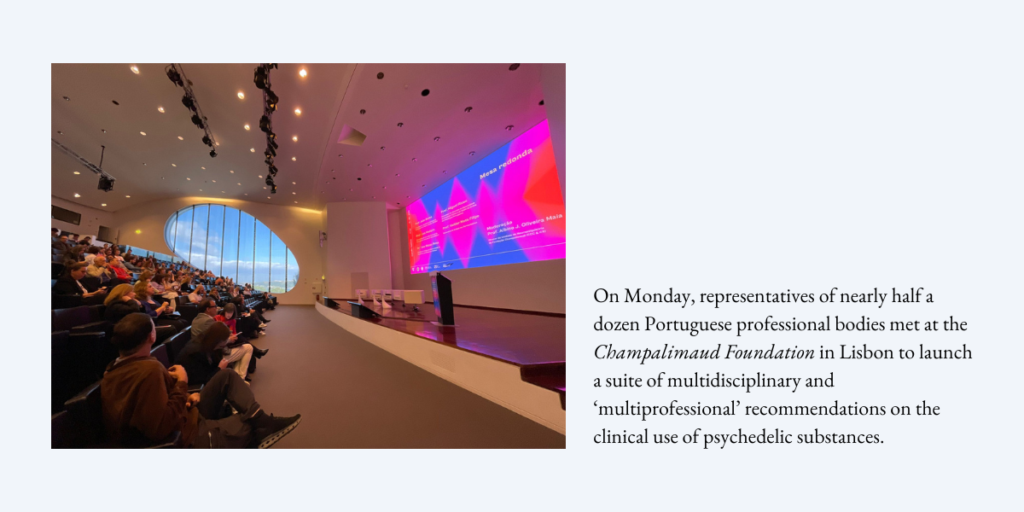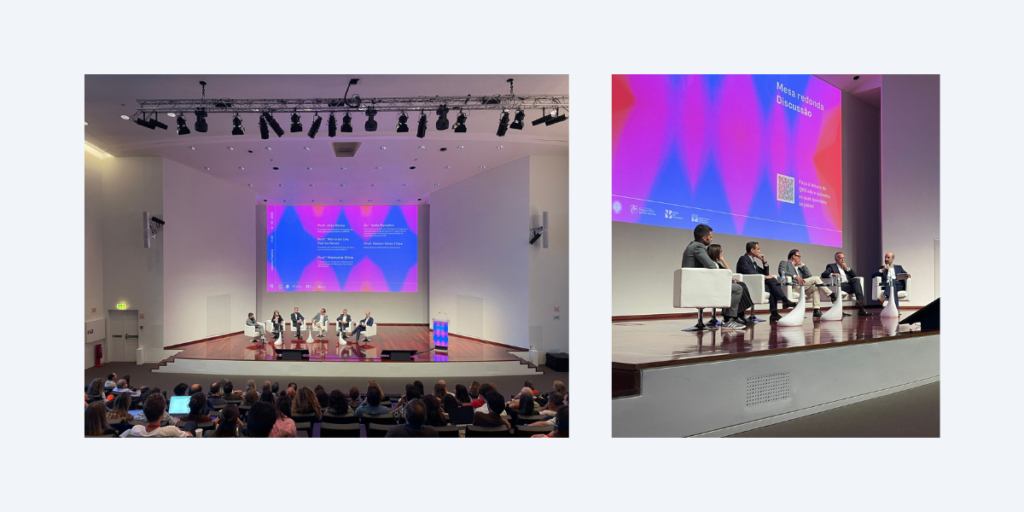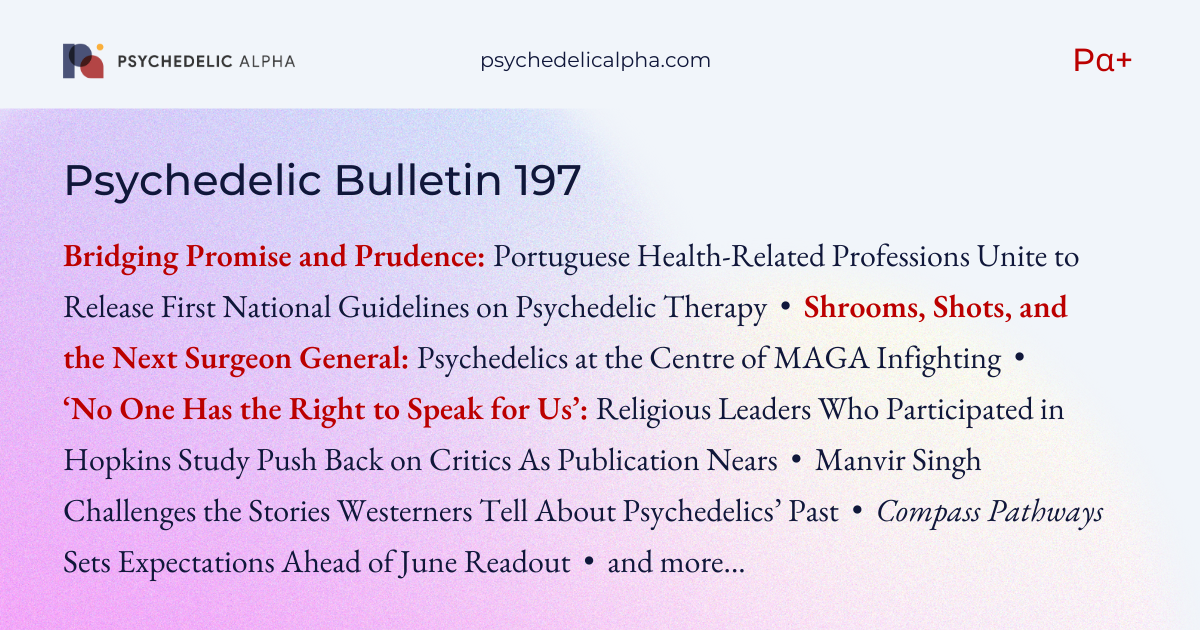In this Issue
- Bridging Promise and Prudence: Portuguese Health-Related Professions Unite to Release First National Guidelines on Psychedelic Therapy
- Shrooms, Shots, and the Next Surgeon General: Psychedelics at the Centre of MAGA Infighting
- ‘No One Has the Right to Speak for Us’: Religious Leaders Who Participated in Hopkins Study Push Back on Critics As Publication Nears
- Manvir Singh Challenges the Stories Westerners Tell About Psychedelics’ Past
- Compass Pathways Sets Expectations Ahead of June Readout
- and more…
***
On Monday, representatives of nearly half a dozen Portuguese professional bodies met at the Champalimaud Foundation in Lisbon to launch a suite of multidisciplinary and ‘multiprofessional’ recommendations on the clinical use of psychedelic substances.
Those recommendations were formed by a working group that included the Portuguese:
- Pharmaceutical Society (Ordem dos Farmacêuticos),
- Medical Association (Ordem dos Médicos),
- Psychologists Association (Ordem dos Psicólogos Portugueses),
- Society of Psychiatry and Mental Health (Sociedade Portuguesa de Psiquiatria e Saúde Mental),
- National Council of Ethics for the Life Sciences (Conselho Nacional de Ética para as Ciências da Vida), and
- the Champalimaud Foundation.
The Presidents of each of these Associations and Societies attended the launch event.
The recommendations document—which is currently only available in Portuguese—emphasises that the clinical use of psychedelics should be handled as medicines, while raising specific considerations.
That point, combined with ‘promising results’ and ‘anticipation of approvals’, they suggest, calls for specific recommendations for the clinical use of psychedelics. That effort was a joint initiative from the Portuguese Society of Psychiatry and Mental Health (Sociedade Portuguesa de Psiquiatria e Saúde Mental), the authors note, along with the Champalimaud Foundation, which has coordinated national clinical trials with psychedelics in the country.

The document itself first sets out ethical and regulatory challenges associated with psychedelics’ use in clinical settings, then moves on to considerations around when they should be indicated, around the non-pharmacological (psychological) intervention used alongside psychedelics, and specifics around informed consent.
Psychedelics have a ‘clear impact on decision-making capacity’, the document notes, for example, both during and following the acute effects of the drug, with those suffering severe mental illnesses particularly vulnerable. Another is the fact, the authors note, that psychedelics are ‘also sought after for other uses, namely recreational, religious or spiritual’. That use, they note, is ‘on some occasions illicit.’
Albino Oliveira-Maia, director of the Champalimaud Neuropsychiatry Unit and member of the working group, told Psychedelic Alpha that psychedelics “are not a unique case in relation to substances in which there can be an interest in consumption outside the medical system and within the medical system.”
Rather, “the circumstance that is specific in this case is that we are making a move to transform substances that exist outside the medical, pharmaceutical and clinical world into medicines”, he continued.
“Medicine and psychedelic science have too little science and, in my opinion, too much activism”, Oliveira-Maia told us.
Other issues named in the report include equity and access, generating additional safety data and implementing a pharmacovigilance plan, how to continue providing care to and monitoring patients after psychedelic treatment, heterogeneity in psychological interventions and their reporting in the literature, and avoiding ‘the risk of prioritising profit over the real purpose of treating the disease’.
While the document itself, with an impressive group of contributors, is an achievement in itself, more so is “the fact that this kind of broad-based collaboration is happening at all”, according to Tadeusz Hawrot, founder of PAREA. What’s more, the event was open to the public, with no charge, meaning the audience included patients, advocates, and others. Following the presentations, all participants could pose questions to the professional body representatives via an anonymous digital platform.
“What stood out to me is that this was the first time, globally as far as I know, that major medical and professional societies came together to issue joint recommendations on the clinical use of psychedelics”, he added. “That’s crucial,” Hawrot continued, “because the success of psychedelic therapies won’t just depend on the science or the regulatory side… It’ll also hinge on whether healthcare professionals — doctors, psychologists, pharmacists — feel equipped and confident to work with them.”
Indeed, the recommendations’ authors argue that it is only through cooperation and harmonisation of regulations and practices that the clinical use of psychedelics may proceed in a manner that protects patient safety and autonomy.
“This day was a milestone of our work and to the field of psychedelic therapies”, Carolina Seybert, psychologist and researcher at Champalimaud and member of the working group, told Psychedelic Alpha.
“The joint work of the representatives in Portugal for the professional groups involved in these treatments is crucial for moving the clinical implementation in the right direction”, she continued, adding: “I am very happy that we might be an example to be followed by our colleagues in other countries.”
***
In somewhat serendipitous timing, last week, Portugal’s National Authority for Medicines and Healthcare Products, Infarmed, green-lit public financing of Spravato, Johnson & Johnson’s esketamine nasal spray, to be used in hospital settings for adults with treatment-resistant depression who have not responded to three or more different antidepressants.
“The announcement of the approval of national reimbursement for esketamine treatment in Portugal some hours before our event made the public presentation of our recommendations even more timely,” Seybert told us.
As the working group mentioned in their recommendations document, the only psychedelic-like treatment available in Portugal today is off-label ketamine or esketamine (marketed as Spravato).
While the decision was dated May 7th, it hit Portuguese press on Monday, right before the working group delivered their recommendations that evening.
On Wednesday, The Portugal News quoted the President of the Society of Psychiatry and Mental Health (Sociedade Portuguesa de Psiquiatria e Saúde Mental), João Bessa, who described the move as “very positive”, and filling “a need that is deeply felt by our population, specifically in the area of depression, in the most resistant cases.” But he lamented the time it took to have the drug approved for roll-out in the country. “It is clearly late”, he told the outlet, and said that “most European countries” are using the esketamine nasal spray.
***
Given the peculiarities of psychedelics-based treatments, their roll-out and implementation will likely be contoured by the best practices envisaged by groups like professional bodies, as opposed to carbon copies of drug developers’ protocols. Drug manufacturers do not regulate the practice of medicine, after all!

Shrooms, Shots, and the Next Surgeon General: Psychedelics at the Centre of MAGA Infighting
We first wrote about Casey Means and her brother, Calley back in November 2024, when we were considering whether the new administration would embrace psychedelic exceptionalism or ‘just say no’.
Back then, it had been rumoured that the alternative medicine influencer could score a role at the FDA, but it has since become clear that she is Trump’s pick for surgeon general.
While some in the psychedelics field have welcomed the news (Mindbloom founder Dylan Beynon, for example, celebrated the news on Twitter, saying that Means “openly champions psychedelic therapy as a root-cause tool for trauma healing & neuroplastic reset”), the pick appears to have caused infighting within both MAGA and MAHA.
Means, a key RFK Jr. ally, has already drawn criticism from more staunch anti-vaxxers than herself. While, in defending her, the HHS Secretary said that critics were from “entrenched interests” and “industry-funded” voices, that doesn’t appear entirely true, with much of the pushback coming from the MAHA crowd itself…
Sign-in or join Pα+ to continue reading this Issue of the Psychedelic Bulletin…
Join Pα+ Today
Independent data-driven reporting, analysis and commentary on the psychedelics space: from business and drug development through to policy reform and culture.
Already a member? Log In
✓ Regular Bulletins covering key topics and trends in the psychedelics space
✓ Regular articles and deep dives across psychedelic research, policy and business
✓ Interviews with insiders
✓ Monthly interactive database and commentary on psychedelic patents
✓ Quick-take analysis of major developments
✓ A Library of primers and explainers
✓ Access to our full back catalogue


